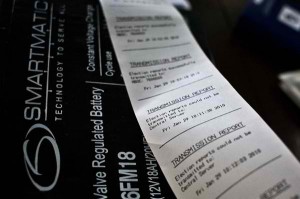By CYRILL YAMBAO and KATHLYN DELA CRUZ

UNLESS the Commission on Elections could prove that the machines used last elections were accurate and fail-safe, the Autonomous Region in Muslim Mindanao should go back to manual voting this August, election watchdogs said.
In a forum held at Adarna House in Quezon City yesterday, the Center for People Empowerment in Governance (CenPEG), one of the co-convenors of the Automated Election System Watch, said the automated system as seen in last year’s elections was “critically defective” in terms of the use of technology, election management, and implementation.
“Manual voting will more likely lead to accurate results,” said Maricar Akol, president of the Philippine National Information Technology Standards Foundation Inc.
The ARMM election is set this August but certain groups are seeking for its postponement.
“In a manual system, it is easy to detect that only one person filled up several ballots because of penmanship. In automated, without security features, one person can shade many ballots undetected,” she explained.
Akol said since the Comelec in May 2010 disregarded features of the AES, doubts were raised on the efficiency of the implementation of the election automation.
“If [only] the automated elections followed the original steps in making [the 2010 elections] fraud-free, then it would have been easier to catch fraud,” she said.
However, she also said the mode of elections will not guarantee a fraud-free election.
Edmundo Casiño of the Philippine Computer Society agreed the Comelec should now correct the errors in the system and address the gaps in the implementation or the voters “will never know come 2016 if the president-elect will be truly the will of the people but rather a machine-voted president.”
The Comelec in the last elections reportedly disabled some security features of the PCOS machines like the internal ultraviolet lamp that automatically detects whether or not the ballots are official.
He added the manual voting would result to a “more transparent and more consistent electoral process.”
CenPEG Director for Policy Studies Bobby Tuazon said there is a need to conduct an independent election source code review to ascertain that there were no bugs and errors in last year’s elections.
Comelec has yet to comply with the Sept. 21, 2010 decision of the Supreme Court regarding the release of the source code for independent review by CenPEG.
Tuazon also said the Comelec has imposed restrictions regarding the source code review such as conducting the process within the Comelec headquarters, where CCTV cameras are installed.
“May super imposing security consideration. Ibig sabihin takot [sila] na malaman na may weaknesses ang security system (There is a super imposing security consideration. This means the Comelec fears that the weaknesses of their security system will be revealed),” he added.
Pablo Manalastas, CenPEG Information Technology (IT) Consultant, said the public has the right to know “how the programs counted our votes, read our ballots, and made sense out of our markings [in the ballots].”
“We want to know whether the canvassing programs actually credited the vote that we made for each candidate,” he said.
Former Vice President Teofisto Guingona likewise said it is the right of the citizens to know the truth.
To IT Forensics Expert Al Vitangcol, it’s all about arriving at the truth. “Searching for an excellent IT system for elections suits the needs of the nation,” he said in Filipino.
AES Watch has yet to re-launch the National Search for Product Excellence in IT, a contest open to IT practitioners and the academe.
“Nobody knows our system better than us,” Akol added. “Therefore, we will try to get the best, the most affordable, and the most transparent system that can be easily used by Filipino voters.”
(The authors are students of the University of the Philippines doing their summer internship at VERA Files.)
